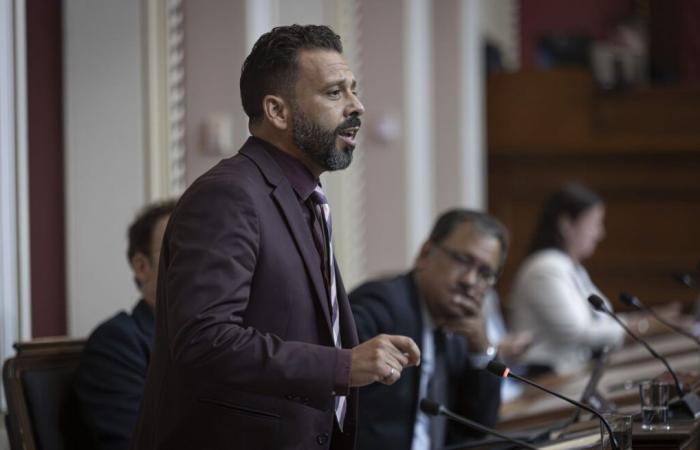Dear Emilie, dear Gabriel, I hope that you will allow me to address you directly in the wake of the column published by Emilie Nicolas on November 21, under the title “Yesterday Again”. We don't know each other. But being an avid reader of Duty and an early supporter of Québec solidaire, I have the impression, like many Quebecers, of knowing you a little. I have immense respect for your respective talents and I admire your determination to support and promote progressive public discourse on a daily basis in your chosen fields.
Know that I was deeply disappointed, sad, to see, once again, this outpouring of hatred following the clumsy words of Haroun Bouazzi, or even the need for Duty to close the comments section of your column, Emilie, in order to avoid excesses. The only positive point: the motivation (read here, the courage) that this situation has instilled in me to write this opinion letter, which I hope is up to par. As an introduction to the subject I am about to discuss, let me tell you a little about my “yesterday”.
I remember some inappropriate remarks from my father on various subjects. At the time, they seemed harmless to me and endorsed by those around him. In the current context, they would be described as racist and misogynistic. Now, I am the fruit of this era. Fortunately, I chose a profession, acrobat, which allowed me to question and test some of the values that built me and I was able to correct certain biases inherited from my childhood. And in 2016, Emilie, I had been ready for a long time to support a commission on systemic racism and, what's more, on systemic sexism.
Being a bit sarcastic, I occasionally like to portray my late father (with a touch of irony and for the simple pleasure of enjoying the sometimes indignant reactions of my interlocutors) as a racist and misogynistic man. For many people, these two words, especially when thrown around without qualification as to their degree of intensity, carry a heavy connotation. This is, I believe, one of the reasons why it seems so difficult to have them accepted in the public sphere, even when followed by the qualifier “systemic”.
I have the feeling that many people (including sometimes the most erudite) have the reflex of thinking, upon hearing this term, that the majority of individuals commanding this system are being accused of being racist, whereas they are not. is nothing.
Mr. Bouazzi's statement on the “construction of the Other” and the group shootings that followed, in my opinion, reinforce this hypothesis. Gabriel, I will not hide from you that I was deeply disappointed by the intervention of the member for Maurice-Richard, not because I refute the content of his remarks (clumsy and exaggerated, we agree), but because He delivered them in a provocative tone and knowing full well that they would divide.
In the days that followed, I felt my solidarity ardor waver. She's still wavering. This is not what I expect from a political party that calls itself progressive and forward-thinking. I often heard my father, a man of many proverbs, quote King Philip II of Macedonia: “Divide and rule.” If there is one that perfectly reflects the current global political climate, it is this one, and we must at all costs rise up and move away from this retrograde conception of democracy.
Returning to this episode which, like many others, will quickly become anecdotal in the political landscape, I liked to imagine Mr. Bouazzi formulating his intervention by humbly inviting his colleagues in the chamber, trembling in his voice, to pay attention how, sometimes, we construct the Other, and remind everyone as well as themselves of the importance, the force and the weight of words. It was he who, in my opinion, was the first to miss this “opportunity to make Quebec shine within America through its difference”. Moreover, this divisive posture of the most left-wing fringe of our southern neighbors is undoubtedly not unrelated to this missed opportunity to elect a woman at the head of the leading world power, Kamala Harris, and to block the road to Donald Trump, this insensitive being who obviously lacked love during his life.
Sadly, the Quebec political-media ecosystem was not more “assured”, once again, to temper the ardor for the future.
Some will say that it is difficult to contain your emotions when faced with repeated feelings of aggression. As I thought about these lines I was going to write, I remembered my recent reading of the documentary play Polytechnic Projectby Marie-Joanne Boucher and Jean-Marc Dalphond. The actors return to the first, oh so altruistic, speech by imam Hassan Guillet following the horrible terrorist attack at the Grand Mosque of Quebec in 2017, in which he refers to the “seven” victims of the tragedy . Six faithful and… “one other”. By including the man responsible for the attack, he showed unparalleled empathy for the “Other”. He recognized the biases that had built the attacker's life path towards this unthinkable gesture.
The piece culminates, in conclusion, on the need to create bridges between extreme thoughts and recalls the importance of keeping, at all costs, the discussion open if we want to hope one day to overcome our darkest collective biases, which draw their sources in each of our individual stories.
Yesterday, and still today, I work within several collectives. I learned, over time, to present things in such a way as to avoid, as much as possible, unnecessary provocations. I understood that they are, most of the time, obstacles to reaching consensus and collective success. I dream of the day when our politicians will embrace their role within the National Assembly as part of a whole, because convinced that it is the best option to survive, to promote the social values that are close to their hearts and serve the people well.
As a proud descendant of my father, I would like to leave you with this timeless motto (thanks, Dad): “There is strength in numbers”! Let's come together to celebrate the strength of our differences.
Oh!… And I too, would love a rum, no matter the brand, with you two!






